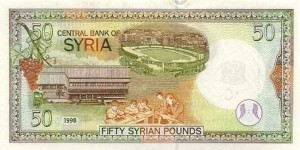 Syria’s currency has come under intense pressure in recent weeks as rebels have taken their battle closer to the centre of the capital and international powers have begun talking about military intervention in the country’s escalating civil war.
Syria’s currency has come under intense pressure in recent weeks as rebels have taken their battle closer to the centre of the capital and international powers have begun talking about military intervention in the country’s escalating civil war.
The value of the Syrian pound has dropped by more than 15 per cent on the black market since the start of November as military, diplomatic and economic pressures mount on the regime, raising the possibility of an eventual currency collapse.
The combination of the falling pound, international sanctions and the choking of supply routes amid widening conflict is driving prices of basic goods ever higher.
One Damascene said she had spent 650 pounds ($9) the previous day on a cooked chicken that would have cost about 350 a few months ago. “Life in Syria is very, very expensive now,” she said. “The value of the dollar is increasing very, very fast.”
At the start of the uprising in March last year, the pound was selling for about 47 per dollar through both official channels and the black market. It has been sliding ever since, particularly on the black market, as demand for foreign currency has surged while foreign currency earnings from oil exports and tourism have all but vanished.
Until now, central bank interventions have mostly managed to keep the pound’s depreciation at a manageable rate, with its black market dollar value staying below 75 for most of the year.
However, in November it slipped into the 80s, and attempts by the authorities to curb the black market by bringing official rates closer to it and increasing the penalty for illegal trading did not prevent the pound’s black market value from plunging to 90 this week, according to Damascenes.
“The economic situation is disastrous,” said one Damascus-based economist. “They inject some money, but after a while it is absorbed by the market – and we are back in the same situation.”
It is not clear how many more foreign reserves the central bank has left to fight these pressures. Adib Mayaleh, Syria’s central bank governor, told the FT in September that Syria had spent less than 10 per cent of its foreign exchange reserves since the start of the crisis – although many independent analysts say well over half are likely to have been spent, unless money has come from outside sources.
The central bank on Wednesday declined to respond to questions about its foreign exchange holdings – which officially stood at $15.1bn in August – the Syrian currency or the state of the wider economy.
Analysts say the government may eventually be forced to give up defending the currency in order to protect its reserves.
“I think there are several indications that government has been under strong pressure in the last few weeks,” said Jihad Yazigi, editor of the Syria Report business newsletter. “At one point it’s going to decide – do we fight the battle to the last man?”
Inflation, caused in part by disruption to production, manufacturing and supply as the civil war escalates, is adding to exchange rate pressures. In August the government said inflation was running at about 40 per cent, now it is thought to be at about 50 per cent.
The regime meanwhile has a budget crisis on its hands, with revenues forecast to decrease drastically, leaving a deficit of 745bn pounds (about $10bn), according to government figures. A recent report that banknotes have been flown in from Russia has fuelled speculation that the authorities are printing money to plug the gap, potentially increasing inflationary pressure.
According to the non-profit journalism site Pro Publica, 240 tonnes of banknotes were flown in to Syria this summer from Russia, which reportedly agreed to print Syrian money after previous printing arrangements were affected by sanctions.
Though the ProPublica investigation did not find out the currency or denomination of the money, David Butter, an economic analyst at the Royal Institute for International Affairs, said that if it was in Syrian pounds, the cargo would seem to represent “probably more than would be required for a normal replacement of banknotes”.
For now, the regime is continuing to pay salaries. But economists say the cumulative economic pressures of nearly two years of instability may soon become as difficult to contain as the armed insurgency itself.
“There’s symptoms that it is getting a lot tougher,” said Mr Butter. “We’re not at the point of economic pressures tipping things away from the regime, but we might not be too far from it.”
Financial Times

Leave a Reply
You must be logged in to post a comment.